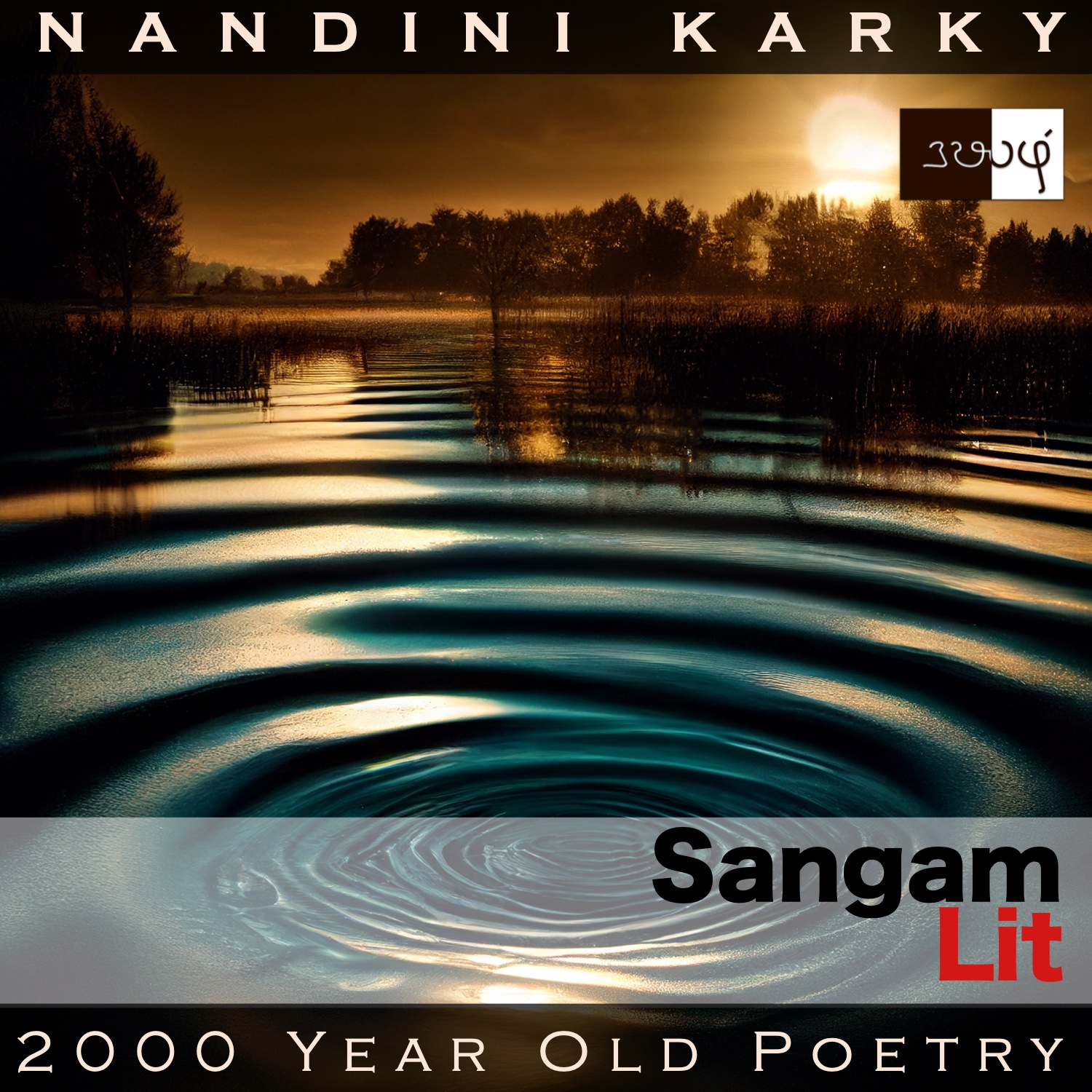Podcast: Play in new window | Download
Subscribe: Apple Podcasts | Spotify | Amazon Music | Android | iHeartRadio | TuneIn | RSS | More
In this episode, we relish a series of striking similes, as depicted in Sangam Literary work, Puranaanooru 70, penned about the Chozha King Kulamutrathu Thunjiya Killivalavan by the poet Kovoor Kizhaar. The verse is situated in the category of ‘Paadaan Thinai’ or ‘King’s praise’ and talks about the wealth and generosity of this king.

தேஎம் தீம் தொடைச் சீறியாழ்ப் பாண!
‘கயத்து வாழ் யாமை காழ் கோத்தன்ன
நுண் கோல் தகைத்த தெண் கண் மாக் கிணை
இனிய காண்க; இவண் தணிக’ எனக் கூறி;
வினவல் ஆனா முது வாய் இரவல!
தைஇத் திங்கள் தண் கயம் போல,
கொளக்கொளக் குறைபடாக் கூழுடை வியல் நகர்,
அடுதீ அல்லது சுடுதீ அறியாது;
இரு மருந்து விளைக்கும் நல் நாட்டுப் பொருநன்,
கிள்ளி வளவன் நல் இசை உள்ளி,
நாற்ற நாட்டத்து அறு கால் பறவை
சிறு வெள் ஆம்பல் ஞாங்கர் ஊதும்
கை வள் ஈகைப் பண்ணன் சிறுகுடிப்
பாதிரி கமழும் ஓதி, ஒள் நுதல்,
இன் நகை விறலியொடு மென்மெல இயலிச்
செல்வைஆயின், செல்வை ஆகுவை;
விறகு ஒய் மாக்கள் பொன் பெற்றன்னதோர்
தலைப்பாடு அன்று, அவன் ஈகை;
நினைக்க வேண்டா; வாழ்க, அவன் தாளே!
Another song directing a fellow poet to a patron king! The poet’s words can be translated as follows:
“O bard with a small lute whose strings render honey-like sounds, you tell me, ‘Listen to these beats from the clear-eyed drum with a fine rod that looks like a pond turtle stringed to a stick.’ You ask me to take rest and then leave. And when I do, you ask me unceasing questions, O old and wise supplicant!
Akin to a cool pond on a day in the month of ‘Thai’ that renders water copiously no matter how much is taken out, his tall mansion renders food unceasingly. Only the cooking fire has it seen, and never, the scorching fire; It’s a fine country where two medicines flourish and he is the ruler of that land, the famous Killivalavan. Thinking of his good name, take along with you, the dancing maiden. The one, who smells fragrant with the ‘pathiri’ flower that grows in the small hamlet of Pannan, renowned for his charity, where desiring sweet fragrance, six-legged insects buzz around the small white lily. She is the one, who has a glowing forehead and a pleasant smile. Go to the town of Killivalan along with her slowly, and if you do, you will earn all the wealth you need. Unlike that case of a woodcutter finding gold in the forest, his charity is not a rarity; Doubt not; Long may he live!”
Time to delve deeper into the nuances of these words! The poet addresses the bard as one who wields a small, possibly hand-held lute, whose strings seem to render a melody to the ears, akin to honey to the taste buds. On that note of musical similes, the poet brings another one comparing the image of a small drum with a playing rod to that of a pond turtle that is tied to a stick. This image is presented as the words of the bard, asking this poet to rest there and listen to the music from his drum. As the poet accepts that request and rests, the bard then showers questions many on the poet. No doubt these are about ways to find wealth and security!
Deciding to answer all the questions of the bard in one go, the poet talks about the Chozha king Killivalavan, in whose mansion, food is served without a break, and to etch this in the mind of the bard, the poet compares it to water that keeps sprouting over and over in a cool pond in the month of ‘Thai’, no matter how much is drawn out. A moment here to appreciate the nuanced meaning in this statement. The month of ‘Thai’ is the month between January 15 and February 15 in contemporary times and marks the harvest festival of Pongal, celebrated to this day by Tamils all over the world. This month happens to fall at the end of the monsoon season, after rains have fallen and filled the ground water in this region. So that’s why, the ponds are so full of water in this particular month. Then, the poet mentions something about that being the land where two medicines flourish and this refers to food and water being in plenty in that land.
Then, the poet advises the old bard to take along with him, the dancing maiden, who is fragrant like a trumpet-flower that grows in the town of another chieftain called Pannan, known for his generosity. Saying if they both were to go trusting in the good fame of Killivalavalan, then all the wealth they ever need will be theirs. Finally, the poet says that the bard finding favour with the king is not some freak rarity like the case of a woodcutter finding gold but is something the bard can be fully sure of, and he concludes by blessing the king with a long life.
It was intriguing to see the reference to a woodcutter finding gold in a forest and made me wonder if it had anything to do with the fable of the woodcutter and the golden axe, an Aesop fable! Maybe it’s just a statement or maybe the poet is quoting a story that could have travelled either ways between Aesop’s Greece and this ancient Tamil land. A verse that delights us with the many similes comparing lute strings to honey and an irreducible pond to unceasing charity of food. A song in which a poet delights in passing on the path to his good fortune to another, illustrating the ripples of kindness that flow endlessly across space and time!




Share your thoughts...